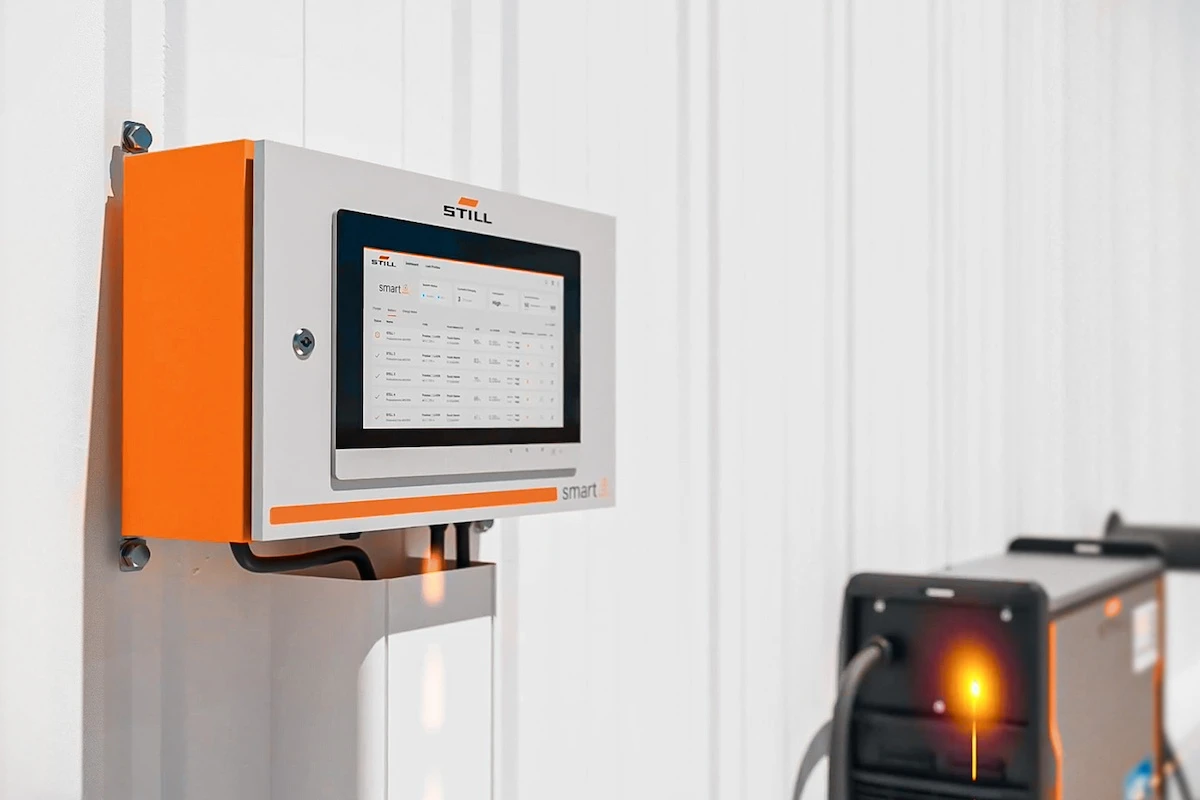Smart Charging: Charge for less at the right time
STILL makes fleet charging more economical and efficient
Hamburg, 15 December 2023 - In combination with the "Smart Charging" charging management system from the Hamburg-based intralogistics provider STILL, lithium-ion batteries show what they are really made of. In this case, smart charging means reducing costs. A reference customer with seven lithium-ion charging stations was able to save around 10,000 euros in energy costs per year.

If you charge your industrial truck fleet at the wrong time, you usually pay a lot more. This is because the price of electricity across Europe is based on supply and demand. In other words: Electricity is most expensive when demand is particularly high. In Germany, there is another specific aspect that affects companies: Industrial customers who consume more than 100,000 kWh per year always pay the price of their highest monthly peak load. The higher the peak, the more expensive each kilowatt hour is for the company that month.
Charge lithium-ion batteries intelligently and save costs
"These load peaks and the resulting high energy costs can be avoided in many cases," says Gesa Kaatz, energy expert at Hamburg-based intralogistics specialist STILL: "An intelligent charging strategy can be used to monitor and control when and how quickly industrial trucks are charged. This can quickly and significantly reduce the fleet's energy costs. The aim is to avoid power peaks and to charge the fleet at the right time".
This is made possible by a technological solution that STILL offers under the name "Smart Charging". With this system, the battery and all processes relevant to the charging of the forklift truck fleet can be monitored and controlled completely, digitally and transparently. Only those who know exactly when and how much energy is needed and consumed can reliably and proactively plan their charging processes and thus the availability of their trucks and the smooth flow of materials. The STILL Smart Energy Unit (SEU) networks the stationary chargers in the company and ensures efficient energy distribution. This allows charging statuses to be analysed, capacities to be planned and charging processes to be prioritised.
Investment amortised after just one year
"The potential savings we can achieve with Smart Charging are considerable," explains Kaatz. For example, extensive tests at a medium-sized logistics service provider with a total of seven lithium-ion charging stations have shown that the use of intelligent charging technology alone saves almost €10,000 in energy costs per year. In this particular case, the purchase of the Smart Energy Unit was amortised in just one year.
To set up Smart Charging, STILL's energy consultants first analyse the potential energy savings in the company together with the customer and then put together the necessary components. The chargers are all networked and many options can be set in the Smart Energy Unit. For example, charging limits can be set for certain time slots, or chargers can be prioritised. "In this particular case, we wanted two of the seven charging stations to provide maximum charging power at all times. This supply must not be compromised, so the other charging stations must have a lower priority," explains the energy consultant. Further prioritisation takes place, for example, with regard to the state of charge of the batteries. Batteries with a low remaining capacity are given priority over batteries with a higher capacity.
Lithium-ion technology is a prerequisite
A prerequisite for intelligent energy management is the use of lithium-ion batteries. The advantage of lithium-ion batteries is that they can be easily recharged between shifts, making them much more flexible than lead-acid batteries. In the past, they were usually all charged at the same time at the end of a shift. "This led to unintended power peaks with expensive consequences," says Kaatz. Lithium-ion batteries, on the other hand, can be conveniently recharged even during short breaks. They are also up to 30 percent more efficient than lead-acid batteries and more readily available, as there is no need to change batteries. Kaatz concludes: "By switching from lead-acid technology to lithium-ion technology, our reference customer has an additional savings potential of around 20,000 euros per year - in addition to the savings of around 10,000 euros through Smart Charging".


